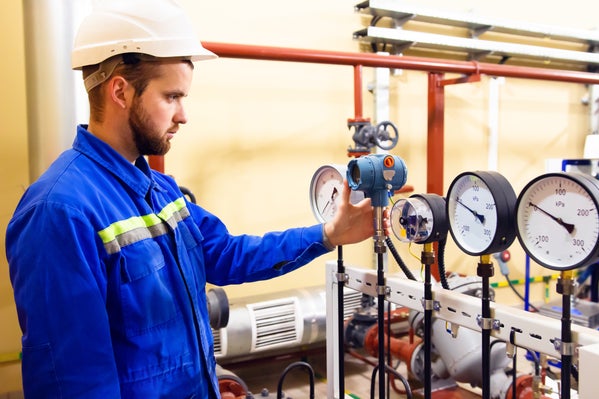At A Glance: Process Technician
Process technicians work to control and operate chemical processes and systems of machines. They may work in a laboratory, processing plant, refinery, or other environments that put them in contact with many types of substances. Technicians regularly interact with sensors, storage tanks, filtration systems and other equipment to monitor and assess the chemical composition of a substance.
To become a process technician requires at least an associate's degree. Employers will require a few months to a year of on-the-job training. Process technicians earn an average of $29.84 an hour.
Entry Level Requirements
Associate's Degree
Process Technicians typically must have an associate's degree or similar combination of training and industry certifications.

Energy production is a
Top 3
Career field in the TEAM region, including Coal, Oil and Gas.
How much can I make?
Hourly Rate: $14 - $37/HR.
Job Details: Process Technician

Commonly Performed Tasks
There are many tasks that process technicians must perform regularly. Technicians are responsible for systems of machines or chemical processes. Many of their day-to-day tasks revolve around monitoring and inspecting these machines and materials. They collect and test substances throughout the chemical process, document their findings, and adjust processes based on their tests. These regular tasks require coordination and communication with co-workers.
- Monitor instruments or other indicators to verify process conditions
- Regulate or shut down equipment during emergency situations as directed
- Operate chemical processes or systems of machines using control boards or computers
- Collect and test sample materials
- Inspect operating units to ensure that all are functioning and to maintain maximum efficiency
Required Job Skills
Process technicians require specific skills, abilities, and knowledge to do their jobs effectively. They must be comfortable working in a variety of environments and with a variety of materials. The nature of the job requires technicians to work well under pressure and to emphasize quality and safety.
- Identify, analyze, and solve complex problems
- Concentrate on a task without being distracted
- Knowledge of materials, processes, and systems
- Effective oral and written communication
- Know chemical properties and processes
Education & Training Information
Programs and Opportunities
Community College of Beaver County
Program: Process Technology
Certification: Associate's Degree
Length: 2 Years
Pierpont Community & Technical College
Program: Applied Process Technology - Instrumentation
Certification: Associate's Degree
Length: 2 Years
Pierpont Community & Technical College
Program: Applied Process Technology - Energy Systems Operation
Certification: Associate's Degree
Length: 2 Years
West Virginia Northern Community College
Program: Petroleum Technology
Certification: Certificate
Length: 1 Year
Community College of Allegheny County - West Hills Center
Program: Mechatronics Technology
Certification: Associate's Degree
Length: 2 Years
Pierpont Community & Technical College
Program: Petroleum Technology
Certification: Associate's Degree
Length: 2 Years
